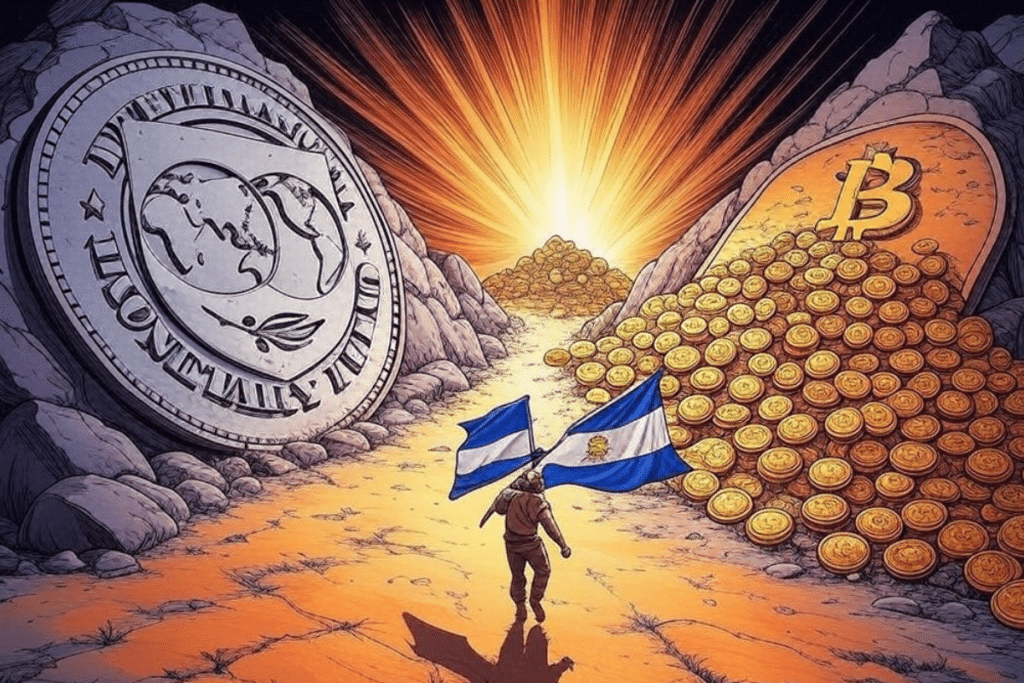17h05 ▪
4
min read ▪ by
When a State challenges international institutions, the lines sometimes shift. Facing El Salvador and its president Nayib Bukele, the International Monetary Fund (IMF) today seems to be retreating. After demanding a halt to Bitcoin purchases, it must now deal with a country that, without renouncing its official commitment, continues to bet on the king of cryptocurrencies through indirect means. A lesson in financial strategy showing that even giants must sometimes adapt.


El Salvador still buys bitcoin despite the December 2024 agreement
In April 2025, El Salvador’s Bitcoin Office confirmed the acquisition of 7 new bitcoins for more than 650,000 dollars. Yet, at the express request of the IMF, an agreement was signed in December 2024: it imposed the halt of all public BTC accumulation before December 2025 and the liquidation of funds held by the State.
But Rodrigo Valdes, director of the IMF’s Western Hemisphere Department, stated that “El Salvador continues to respect its non-accumulation commitment“. A carefully chosen phrase: the current strategy allows buying bitcoin through non-governmental entities or subtly changing the legal nature of BTC holders.
Lina Seiche analyzes this rhetoric:
It was never said that they had to stop buying today; it is about a future obligation.
By playing on semantics, Bukele thus maintains his pro-Bitcoin image while avoiding violating his agreement with the international institution.
The IMF tries to save face: between economic demands and calculated tolerance
Officially, the IMF now focuses its discourse on broader reforms: governance, transparency, fight against corruption. Rodrigo Valdes highlights:
El Salvador’s program is not centered on Bitcoin, it focuses on deep structural reforms.
Yet, the initial terms were clear: to unlock the $1.4 billion loan, El Salvador had to cease all public involvement in bitcoin and disclose the status of its cryptocurrency holdings, including Chivo, the Bitcoin management agency, and even the hydroelectric plant on the Lempa river.
This IMF turnaround seems to reflect a type of forced pragmatism: in a context where Bukele does not budge an inch on the crypto front, it is better to save the essential – macroeconomic reforms – than risk a political showdown. A flexible approach that could well be exported to other upcoming negotiations.
The Salvadoran trick: preserving Bitcoin enthusiasm while appeasing funders
By promising technical compliance, El Salvador manages to combine its image as a Bitcoin pioneer with the demands of international funders. While the IMF is satisfied with meeting “fiscal” criteria, the Bukele government quietly multiplies pro-crypto initiatives. Anndy Lian, a blockchain expert, perfectly summarizes the situation:
El Salvador maintains its Bitcoin-friendly image while securing vital funding.
Internally, economic momentum is accelerating: increased tourism, foreign investments in Bitcoin infrastructure, and strengthening of the local crypto network.
On the markets, although the bitcoin price has experienced a recent bearish phase, fundamentals in El Salvador remain solid. DeepSeek AI still sees an optimistic price scenario by the end of 2025, despite current volatility.
Ultimately, Bukele moves like a chess player, securing the country’s economic future without betraying his ideological commitment.
However, one question remains unanswered: wouldn’t this change of stance by the IMF have been facilitated by the recent discussions between Nayib Bukele and Donald Trump, symbolizing a more lenient America towards alternative financial experiments?
Maximize your Cointribune experience with our “Read to Earn” program! For every article you read, earn points and access exclusive rewards. Sign up now and start earning benefits.
La révolution blockchain et crypto est en marche ! Et le jour où les impacts se feront ressentir sur l’économie la plus vulnérable de ce Monde, contre toute espérance, je dirai que j’y étais pour quelque chose
DISCLAIMER
The views, thoughts, and opinions expressed in this article belong solely to the author, and should not be taken as investment advice. Do your own research before taking any investment decisions.



